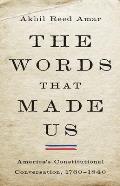Amar’s Constitutional Conversation Continues in Concord, 16 Jan.
On Thursday, 16 January, the Concord Museum will host Akhil Reed Amar, Sterling Professor of Law and Political Science at Yale University, speaking on the U.S. Constitution.
Amar’s books include The Bill of Rights (1998), America’s Constitution (2005), America’s Unwritten Constitution (2012), and The Words That Made Us: America’s Constitutional Conversation, 1760–1840 (2021).
The event description says:
This event starts at 7:00 P.M. Tickets for seats at the Concord Museum are free for members, $10 for the public. People can also register to watch online for free.
Amar’s books include The Bill of Rights (1998), America’s Constitution (2005), America’s Unwritten Constitution (2012), and The Words That Made Us: America’s Constitutional Conversation, 1760–1840 (2021).
The event description says:
Uniting history and law through the biggest constitutional questions early Americans confronted, Professor Amar discusses the formative decades of the Constitution after its ratification and its resonance today. As Professor Amar notes, our national “constitutional conversation continues” to this day “in courtrooms, classrooms, newsrooms, family rooms and everywhere in between.”A couple of years ago, however, Gregory Ablavsky wrote in the Michigan Law Review that Amar’s description of that “constitutional conversation” is too limited:
He focuses much of the book around the idea of a “constitutional conversation,” a cacophonous and capacious dialogue that encompassed many Anglo-Americans. Unfortunately, his account of that conversation quickly collapses to the views of a handful of too-familiar figures—a cramped vision that reads backward our own sometimes narrow constitutional conversation privileging a clubby legal elite oriented around the Supreme Court. Democracy, “America,” and “the people” all feature prominently here, but only as abstractions that get seen but not heard. This is a notably undemocratic history of democracy.That offers plenty to think about.
For over a generation, historians have offered a different version of the constitutional conversation—one that is fuller and more inclusive, highlighting the many ways that the actual people accessed and shaped constitutional law. . . . The point of this approach is not more inclusiveness to serve current sensibilities; it is that a diverse range of actors and arguments mattered. They shaped law. Often, the “Big Six [Founders]” were reacting more than acting. . . .
None of this is to fault Amar for not writing a different book. It is to fault him for failing to write the book that he claims he did write, about the early republic’s constitutional conversation. Without much evidence, he announces his conclusory, if regretful, finding that the views of those outside the room didn’t matter, thereby echoing past generations who labored so hard to ignore these voices. . . .
Why not instead have a constitutional history that reflects the pluralism that Amar acknowledges? People with “myriad ethnic backgrounds” and “ideologies” were already present at the beginning, sharing a continent and a nation. They might not all have been at the Constitutional Convention or in [George] Washington’s cabinet, but as Amar argues, “America” was: the document’s drafters were keenly aware of the complex nation that they sought to govern.
This event starts at 7:00 P.M. Tickets for seats at the Concord Museum are free for members, $10 for the public. People can also register to watch online for free.


No comments:
Post a Comment